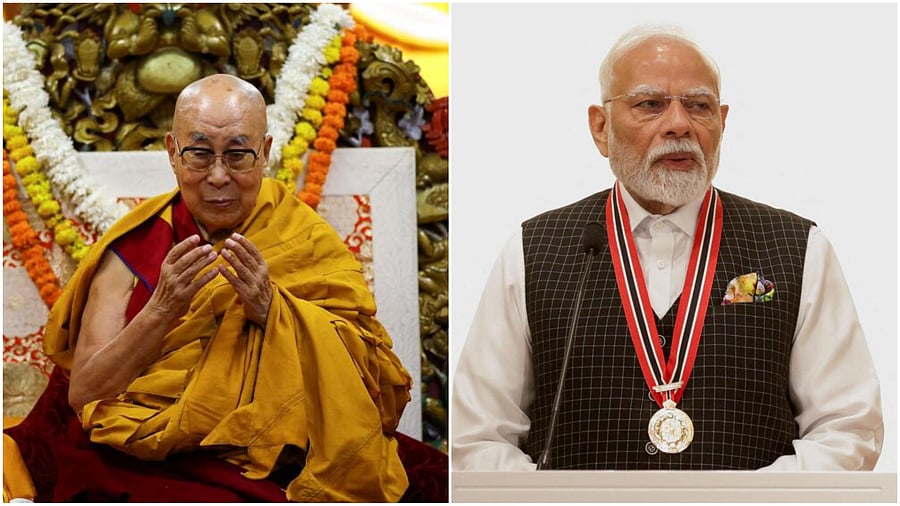
The Dalai Lama and PM Narendra Modi (R).
Credit: Reuters Photos
New Delhi: Beijing has lodged a protest with New Delhi a day after Prime Minister Narendra Modi wished ‘a long life’ to the 14th Dalai Lama on the 90th birthday of the Tibetan Buddhist monk, who has been an icon of non-violent protest against China’s rule of Tibet over the past seven-and-a-half decades.
China also protested against the presence of India’s Minister for Parliamentary Affairs, Kiren Rijiju, at the celebrations of the Dalai Lama’s birthday held by the Tibetan Government in Exile in Dharamshala on Sunday.
“As is known to all, the 14th Dalai Lama is a political exile who has long been engaged in anti-China separatist activities under the guise of religion and has been plotting to split Tibet from China,” Mao Ning, the spokesperson of the Ministry of Foreign Affairs of the government of the communist country, told journalists in Beijing. She was responding to a question from a journalist of the Global Times, a media outlet affiliated with the Communist Party of China, on Modi’s greetings to the Dalai Lama on X.
She also said in response to another question that China-India relations were “at a critical stage of improvement and development”. “We are willing to work with India to push China-India relations forward along a healthy and stable track,” she added, while responding to a journalist who asked her about the recent comment by a senior Indian Army officer, who had said that India had not only fought Pakistan during the four-day cross-border military flare up from May 7 to 10, but had to deal with the challenge of the support provided by China and Türkiye to its adversary.
“China and Pakistan are traditional friendly neighbours, and defence and security cooperation is part of the normal cooperation between the two countries and is not directed against any third party,” said Mao.
The prime minister took to X to convey his greetings to the Dalai Lama on his 90th birthday – an annual gesture he had first made in 2021, a year after China’s military aggression along its disputed boundary with India led to a violent and fatal face-off in Galwan Valley and started a stand-off all along the Line of Actual Control (LAC) between the two neighbours in eastern Ladakh.
Rijiju not only attended the celebrations on the occasion of the 90th birthday of the Dalai Lama at Dharamshala in Himachal Pradesh, but also tacitly acknowledged the existence of the Tibetan Government in Exile, formally known as Central Tibetan Administration, as well as the Tibetan Parliament in Exile – a move, which could add to ire of Beijing.
“India should fully realise the high sensitivity of the Tibet-related issues, recognise the anti-China and separatist nature of the 14th Dalai Lama, abide by its commitments on the Tibet-related issues, be cautious in words and deeds, and stop using the Tibet-related issues to interfere in China's internal affairs,” Mao said, adding: China has lodged representations with India in this regard.
The 14th Dalai Lama, earlier this week, not only confirmed that the institution of the Dalai Lama would continue beyond his lifetime but also announced that no one else but the Gaden Phodrang Trust, which he had set up in India in 2011, would have the sole authority to recognise his future reincarnation. His announcement was a move to counter Beijing’s bid to influence the process of selecting his reincarnation, its plan to prop up a claimant loyal to it and use him to fizzle out the global movement against China’s rule over Tibet.
China strongly reacted to the Dalai Lama’s statement from India, stating that the reincarnation of the Dalai Lama, the Panchen Lama and other great Buddhist figures must be chosen by drawing lots from a golden urn, and approved by the central government
The 14th Dalai Lama has been living in exile in India following his 1959 escape from Tibet, which had been occupied by the Chinese People’s Liberation Army (PLA) in 1950-51. The monk, a staunch advocate for non-violence and freedom, has been arguing for “genuine autonomy” – not independence from the Chinese Government’s rule – for Tibet. Beijing, however, still calls him a “separatist” and accuses him of running a campaign to split China..
